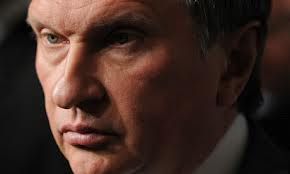
Deep divisions have emerged once again this week over Igor Sechin’s bid to remain front and centre of the Russian energy industry. They offer more public evidence – as if any were needed – of the growing conflicts between the camps of president Vladimir Putin and prime minister Dmitry Medvedev.
Rosneft, the state oil champion Sechin heads, first announced that the conservative ally of president Vladimir Putin had been elected chairman of Rosneftegaz, the state investment vehicle that could play a key role in a much-discussed consolidation of the industry.
But the main spokeswoman for prime minister Dmitry Medvedev, who is pushing privatisation in the face of opposition from Sechin, told Vedomosti newspaper she had heard of no such government directive ordering his election.
Rosneft’s spokesman told beyondbrics that Vladimir Putin had signed a government directive ordering the appointment on May 6 on his last day as prime minister before his inauguration as president.
This directive was then issued to members of the Rosneftegaz board. “The only question that remained was when the board meeting to elect him would take place,” the spokesman said. “For some reason there is all this noise because someone in the [new] government is saying they haven’t seen this directive. But it exists. Rosneft got it from the state property agency.”
Previously, it had only been disclosed that Putin had ordered that Sechin should be elected to the Rosneftegaz board without specifying the position.
The tension over what would appear to be no more than a piece of paper is bubbling over because, as chairman of Rosneftegaz, Sechin could get to oversee a big consolidation by the state of stakes in the energy industry.
Putin already fired a shot across the bows of Medvedev’s wide-ranging privatisation plans in May when he issued an order saying Rosneftegaz could buy the state stakes in the energy sector, instead of having the assets sold on the open market as Medvedev had planned.
Medvedev’s government, as it struggles to pursue a more liberal agenda, is still fighting that. But even though he lost his role as deputy prime minister in charge of the energy industry, Sechin’s clout and his bid to keep the stakes in state hands was further boosted when Putin signed off on the creation of special commission for the energy industry in June and appointed Sechin its chief secretary.
All these moves smacked of the creation of a parallel government for the energy sector with Sechin at its helm, analysts and bankers said at the time.
Few doubted that Sechin was headed for the job as chairman of Rosneftegaz too. But the fact that Medvedev’s government was still insisting on Tuesday that this position was undecided because it hadn’t seen the directive is a sign “the government is continuing to fight,” one banker said.
“They’re trying to do anything they can to derail Sechin. They know they’re not going to win the war but they are trying to pick battles and they are trying everything to delay. The lack of clarity or decision on the future of the energy sector suits the government,” said the banker, speaking on condition of anonymity.
Sechin’s position as chairman of Rosneftegaz would apparently also put him in command of the Rbs48bn sitting on the investment vehicle’s accounts, which it has collected in dividends from the 75.5 per cent stake it holds in Rosneft and the 10.4 per cent stake it holds in Gazprom.
Vedomosti reported on Tuesday that Arkady Dvorkovich, the Medvedev ally who replaced Sechin as deputy prime minister for energy, is calling for most of the funds to be transferred to the budget. Any such move would take away Rosneftegaz’s and Sechin’s main firepower in the privatisation row. Sechin has been hoping to use this cash to buy the state stakes in the energy sector, arguing that turmoil on global markets means that Rosneftegaz is in a position to pay more for the assets than private investors can.
With so much at stake, neither side will give up without a fight.
Source: Financial Times
We use cookies to improve your experience. By continuing to use our site, you accept our Cookies, Privacy Policy,Terms and Conditions. Close X